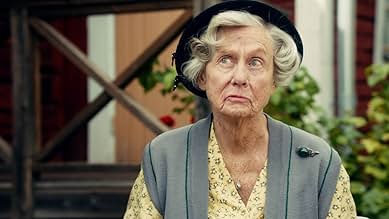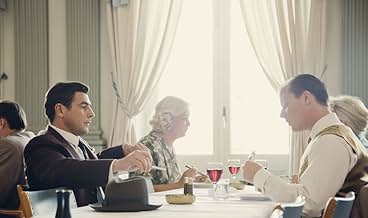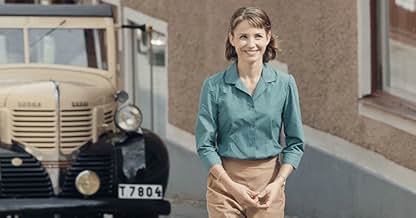Agrega una trama en tu idiomaA young woman is absent from her own wedding and is found murdered the next morning.A young woman is absent from her own wedding and is found murdered the next morning.A young woman is absent from her own wedding and is found murdered the next morning.
- Dirección
- Guionistas
- Elenco
Ida Marianne Vassbotn Klasson
- Dina
- (as Marianne Vassbotn Klasson)
- Dirección
- Guionistas
- Todo el elenco y el equipo
- Producción, taquilla y más en IMDbPro
Opiniones destacadas
With all the interest for Scandinavian crime stories, why not visit the Grand Old Dame of Swedish mystery novels Maria Lang. Fair amount of attention has been paid to period detail in this installment, not just in the mad men suits for men, but even women's hair and make-up do not offend here, as they usually do in retro drama.
But then the production massively fails in the most unexpected place. Or rather, it takes place nowhere at all. There are no establishing shots, no feeling of location whatsoever. We could be in suburban Germany just as well.
Maria Lang has a great sense of place in her books, and a lot of her charm lies in the sense of small town Sweden getting upset by murder. Shame on the makers of this series for ignoring the soul of her work. And a pity for the potential viewers for being robbed the views of idyllic locations. Why on earth leave them out?
But then the production massively fails in the most unexpected place. Or rather, it takes place nowhere at all. There are no establishing shots, no feeling of location whatsoever. We could be in suburban Germany just as well.
Maria Lang has a great sense of place in her books, and a lot of her charm lies in the sense of small town Sweden getting upset by murder. Shame on the makers of this series for ignoring the soul of her work. And a pity for the potential viewers for being robbed the views of idyllic locations. Why on earth leave them out?
The second in the series of Swedish detective thrillers set in the late Fifties concocted a complicated murder mystery involving a bride-to- be, her jilted fiancé (Alexander Stocks), a stepfather with a mysterious past (Bengt Järnblad) and a host of minor characters. Set in a small Swedish village, Christian Eklöw and Christopher Panov's production communicated the hothouse atmosphere, in which everyone knows everyone else's business: secrets cannot be kept for long.
This proved exceptionally ironic, in view of the fact that all the murder suspects, it seemed, were prepared to weave a tissue of lives so as to throw Inspector Christer (Ola Rapace) off the scent. With the help of Ph.D. student Puck (Tuva Novotny), however, he managed to get to the truth of the matter and, in the manner of all good Agatha Christie-derived detective thrillers, revealed the murder in a climactic sequence at the end, when all the suspects were gathered together.
What made KING LILY OF THE VALLEY more interesting, however, was its thematic subtext on the futility of romantic love. The murder victim, it seemed, had a long-standing boyfriend, as well as another admirer Lars-Ove (Philip Panov), who could never admit his true feelings for her. In a village where outward show mattered above all else, she was forced into contracting an unwanted marriage with Joakim. This particular plot-line was contrasted with the romantic tribulations of Puck and her fiancé Eje (Linus Wahlgren): although Linus wanted a white wedding, with Puck ideally wearing his mother's wedding-dress, Puck wanted something else - even though she did not quite know what it was. It seemed as if she was being forced into a similar emotional corner: that is, until a climactic sequence towards the end where she told Eje exactly what she wanted.
Perhaps Puck was a victim of the times: the late Fifties setting in this adaptation proved significant, as it depicted a patriarchal world in which women's life-choices were very limited. Puck was something of a radical character insofar as she did not want to become a homemaker or a child-bearer, but sought a career of her own. However such choices are not available to all women, as the murder victim's fate revealed. The lilies of the valley, that formed a thematic backdrop to this episode, symbolized the futility of most women's struggle to assert themselves.
A melancholy adaptation - although well performed and tightly structured - it offered a pessimistic view of female destiny in mid- twentieth century Sweden.
This proved exceptionally ironic, in view of the fact that all the murder suspects, it seemed, were prepared to weave a tissue of lives so as to throw Inspector Christer (Ola Rapace) off the scent. With the help of Ph.D. student Puck (Tuva Novotny), however, he managed to get to the truth of the matter and, in the manner of all good Agatha Christie-derived detective thrillers, revealed the murder in a climactic sequence at the end, when all the suspects were gathered together.
What made KING LILY OF THE VALLEY more interesting, however, was its thematic subtext on the futility of romantic love. The murder victim, it seemed, had a long-standing boyfriend, as well as another admirer Lars-Ove (Philip Panov), who could never admit his true feelings for her. In a village where outward show mattered above all else, she was forced into contracting an unwanted marriage with Joakim. This particular plot-line was contrasted with the romantic tribulations of Puck and her fiancé Eje (Linus Wahlgren): although Linus wanted a white wedding, with Puck ideally wearing his mother's wedding-dress, Puck wanted something else - even though she did not quite know what it was. It seemed as if she was being forced into a similar emotional corner: that is, until a climactic sequence towards the end where she told Eje exactly what she wanted.
Perhaps Puck was a victim of the times: the late Fifties setting in this adaptation proved significant, as it depicted a patriarchal world in which women's life-choices were very limited. Puck was something of a radical character insofar as she did not want to become a homemaker or a child-bearer, but sought a career of her own. However such choices are not available to all women, as the murder victim's fate revealed. The lilies of the valley, that formed a thematic backdrop to this episode, symbolized the futility of most women's struggle to assert themselves.
A melancholy adaptation - although well performed and tightly structured - it offered a pessimistic view of female destiny in mid- twentieth century Sweden.
¿Sabías que…?
- TriviaThe title is taken from Gustaf Fröding's poem "Kung Liljekonvalje" (King Lily of the Valley), part of which is read aloud by Puck. It's also sung by a choir.
- ErroresIn the 50s Swedish cars drove in the left side of the street, which they correctly do in this and the other episodes, but the steering wheel is wrongly placed in the left side of the car. As in other countries, where cars drive in the left side, the steering wheel was placed in the right side of the Swedish cars.
This is incorrect - Swedish cars always had the steering wheel on the left side.
- Créditos curiososBesides the three recurring roles the cast credits are alphabetized by character name.
- ConexionesFollowed by Inte flera mord (2013)
Selecciones populares
Inicia sesión para calificar y agrega a la lista de videos para obtener recomendaciones personalizadas
Detalles
- Fecha de lanzamiento
- País de origen
- Idioma
- También se conoce como
- Crimes of Passion: King Lily of the Valley
- Locaciones de filmación
- Rådstugugatan, Nora, Örebro län, Suecia(Flower shop)
- Productora
- Ver más créditos de la compañía en IMDbPro
Contribuir a esta página
Sugiere una edición o agrega el contenido que falta

Principales brechas de datos
By what name was Kung Liljekonvalje av dungen (2013) officially released in Canada in English?
Responda



























